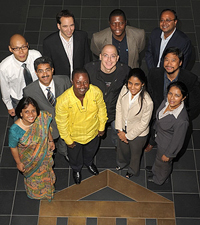Partnership With Sony Electronics to Bring Leading-Edge Tech to Help Ready Students for Career Success
Sony Electronics is partnering with the S.I. Newhouse School of Public Communications to provide state-of-the-art equipment, hands-on training and world-class industry expertise as part of a collaboration that will prepare students for careers in media, entertainment and visual communications. The…


 As she discusses her efforts to promote public accountability and civic engagement in a country with a poverty rate hovering near 40 percent, she leans forward, searching for exactly the right words. Apologizing—unnecessarily—for her English, she talks about the critical need to empower people at all levels to speak out and serve as monitors against corruption in Ecuadorean public life.
As she discusses her efforts to promote public accountability and civic engagement in a country with a poverty rate hovering near 40 percent, she leans forward, searching for exactly the right words. Apologizing—unnecessarily—for her English, she talks about the critical need to empower people at all levels to speak out and serve as monitors against corruption in Ecuadorean public life.